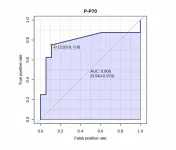(Press-News.org) Pregnant mothers have taken part in a clinical study (the UNITY trial) in Birmingham, which has found that nipocalimab, an investigational, fully human, monoclonal antibody, has the potential to improve the survival rate of unborn babies with rare, early-onset fetal anaemia, as a result of haemolytic disease of the fetus and newborn (EOS-HDFN).
The study investigated pregnancies complicated by severe EOS-HDFN (RhD (D) or Kell (K) alloimmunized pregnant individuals with singleton pregnancies) and evaluated the effects of nipocalimab at weekly intervals from 14-35 weeks of pregnancy.
The University of Birmingham and Birmingham Women’s Children’s NHS Foundation Trust were a study site for a global, multicentre, open-label trial, in which nipocalimab was given for the treatment of pregnancies at high risk of severe EOS-HDFN, and evaluated safety, efficacy, and the maternal metabolism of the monoclonal antibody.
Nipocalimab is an investigational monoclonal antibody, purposefully designed to bind with high affinity to block the fetal/neonatal fragment crystallizable (Fc) receptor (FcRn) and reduce levels of circulating immunoglobulin G (IgG) antibodies, including alloantibodies and autoantibodies that underlie multiple conditions. Blockade of IgG binding to FcRn in the placenta is also believed to prevent transplacental transfer of maternal alloantibodies to the fetus.
Results from a Phase 2 clinical trial published in the New England Journal of Medicine, sponsored by Johnson and Johnson, have demonstrated the majority of pregnant patients with severe HDFN who received nipocalimab achieved a live birth at or after the gestational age of 32 weeks, without the need for an intrauterine transfusion (IUT) throughout their entire pregnancy.
The study demonstrated that 54% of pregnant women treated with nipocalimab gave birth at or after 32 weeks of pregnancy, without any IUTs, compared to 0% in their previous pregnancy. Overall, the perinatal survival was 92%, whereas historically only 10% of pregnancies affected by severe HDFN reach this benchmark.
Of the 46% requiring IUT, the majority were after 24 weeks of pregnancy, and only a single case was performed at 22 weeks, which sadly was complicated by a miscarriage. Nipocalimab was well tolerated by pregnant individuals and newborn/infants with no unusual infections despite IgG lowering in pregnancy. Serious adverse events were generally consistent with pregnancy conditions, HDFN outcomes, and gestational age at birth.
The Birmingham site investigator, Mark Kilby, Emeritus Professor of Fetal Medicine at the University of Birmingham and Honorary Consultant of Fetal Medicine, Birmingham Women’s and Children’s NHS Foundation Trust said:
“For mothers with severe HDFN the outcome not only of the condition but of the treatment, can be devastating. This is why the search for therapies to reduce the consequences of the maternal immune response has been focused on this cohort of women. The clinical study has found that nipocalimab is well tolerated and greatly increases the chance of unborn babies surviving severe EOS-HDFN, requiring less in-utero transfusion therapy.”
The promising results of the UNITY study have prompted the U.S. Food and Drug Administration (FDA) to grant a Breakthrough Therapy Designation (BTD) for nipocalimab for the treatment of alloimmunized pregnant individuals with HDFN. The AZALEA Phase 3 pivotal trial is currently enrolling pregnant individuals who are at risk for severe HDFN at any gestational age, who have a history of severe HDFN in a prior pregnancy.
“Dream come true” as baby born during lockdown through trial
Rosemary and Darren from Ireland were expecting baby Nessa when they took part in the clinical trial. Rosemary had had a previous in-utero transfusion for HDFN, and the couple had a child following treatment. Sadly, the couple lost a second baby after another in-utero transfusion.
Rosemary had contacted her doctors at the Rotunda Hospital in Dublin about the trial as she had previously read about it and saw on Facebook that sites were opening to recruit patients. Rosemary was desperate to avoid another in-utero transfusion and was referred to the Fetal Medicine Centre at Birmingham Women's and Children's Hospital 8 weeks into her pregnancy. She had cell-free fetal DNA testing to confirm the baby was 'suspectable' to the antibodies she had produced. Rosemary then had maternal infusions of nipocalimab intravenously at weekly intervals from 14 to 35 weeks.
Baby Nessa was born at 36 weeks weighing 6 pounds and 13 ounces and without the need for any IUTs.
Rosemary said: “When we were accepted onto the trial, we were both relieved and excited. Following the loss of our little girl Liliana, we were advised not to have any further pregnancies and we were devastated. This trial gave us hope of having another baby.”
“We were pregnant during the Covid lockdowns and as I was commuting from Ireland to Birmingham, it was a big worry but throughout our involvement in the trial, we felt supported, informed, understood and safe. We are forever grateful, the level of professionalism, compassion and empathy shown towards us is something we will never forget.”
“Our two sons, Ollie and Joey now have a little sister, Nessa, who is a bubbly happy healthy 4-year-old, full of mischief, giggles, and fun. To think the trial has given us what we believed was impossible, is a dream come true. To hear the trial has also given others living healthy children is fantastic. In a situation where we, like so many others felt was hopeless, to now know there is a treatment is like a miracle.”
Haemolytic disease of the fetus and newborn
Haemolytic disease of the fetus newborn (HDFN), which is also sometimes referred to as Rhesus disease, is caused by a system of red blood cell antigens (most commonly of Rhesus D type) which raises the pathological antibody response in a pregnant person (red cell alloimmunization). These “pathological antibodies” or alloantibodies can cross the placenta to the fetus and destroy its red cells, leading to progressive fetal anaemia and – if untreated – death of the fetus.
Doctors use ultrasound-directed, invasive, in-utero blood transfusions to treat these seriously unwell unborn babies with a success and survival rate of 98%. However, in 5% of HDFN pregnancies, the mother may have very high levels of extremely potent alloantibodies. This can lead to the development of significant fetal anaemia before 24 weeks.
In these rare cases, in-utero transfusion is much more challenging due to the small size of fetal blood vessels and the immature fetal heart, which makes the unborn baby less able to cope with a blood transfusion. Because of this, the risk of significant complications leading to miscarriage is as high as 20% (1 in 5 pregnancies).
Professor Kilby added: "These are fantastic results. In this group of pregnant women with severe HDFN, the medical management with nipocalimab has significantly reduced the need for early-onset in-utero fetal transfusion and improved the survival of these babies, reducing risks of miscarriage and stillbirth. Furthermore, and very importantly, nipocalimab seems to be well tolerated and safe for the mother and her unborn/newborn baby.”
Professor Kilby concluded: "This research is a huge step forward for mothers who experience severe HDFN, as well as their partners, extended families, and of course, their children. "
END
Birmingham host to investigational treatment trial which could improve outcomes of pregnancies affected by severe haemolytic disease
Case study: “A dream come true” for parents Rosemary and Darren whose daughter Nessa born during the UNITY trial participation
2024-08-07
ELSE PRESS RELEASES FROM THIS DATE:
Drug trial for rare fetal blood disease shows promise for less invasive approach
2024-08-07
AUSTIN, Texas — Data from a new investigational drug that could alter the standard treatment for a rare blood disease suggests it has the potential to delay or prevent anemia and the need for intrauterine blood transfusions in babies who are at high risk for the condition, known as Hemolytic Disease of the Fetus and Newborn (HDFN). Results of the Phase 2 clinical trial of the drug nipocalimab were published today in The New England Journal of Medicine.
HDFN is a serious condition in which the blood types of the mother and her fetus do not match, potentially causing life-threatening anemia in the baby. The current ...
Forever chemical pollution can now be tracked
2024-08-07
Organofluorine compounds — sometimes called ‘forever chemicals’ — are increasingly turning up in our drinking water, oceans and even human blood, posing a potential threat to the environment and human health.
Now, researchers at The University of Texas at Austin have developed a way to fingerprint them, which could help authorities trace them to their source when they end up in aquifers, waterways or soil.
The technique involves passing samples through a strong magnetic field then reading the burst of radio waves their atoms emit. This reveals ...
How fungi elude antifungal treatments
2024-08-07
Every year, life-threating invasive fungal infections afflict more than 2 million individuals globally. Mortality rates for these infections are high, even when patients receive treatment.
Aspergillus fumigatus, the most frequent cause of invasive fungal infection in people with suppressed immune systems, is responsible for approximately 100,000 deaths annually around the world. Poor treatment outcomes result from therapeutic failures and the fungi’s resistance to existing drugs.
A new multi-institutional study led by researchers at Michigan State University has characterized how fungi adapt to restructure their cell walls, effectively ...
ACC Asia 2024 explores emerging trends, evidence-based strategies for improving global heart health
2024-08-07
The American College of Cardiology (ACC) and the Cardiological Society of India will host ACC Asia 2024 on August 16-18 in Delhi, India. This conference will bring together all members of the cardiac care team to examine emerging trends and best practices for cardiovascular disease patient care.
“One of the most meaningful outcomes of the annual ACC Asia conference is the ability to communicate with other cardiologists to strategize and innovate new ideas,” said Eugene Yang, MD, MS, FACC, one of the ACC Asia conference co-chairs. “As ...
CalTech team develops first noninvasive method to continually measure true blood pressure
2024-08-07
Solving a decades-old problem, a multidisciplinary team of Caltech researchers has figured out a method to noninvasively and continually measure blood pressure anywhere on the body with next to no disruption to the patient. A device based on the new technique holds the promise to enable better vital-sign monitoring at home, in hospitals, and possibly even in remote locations where resources are limited.
The new patented technique, called resonance sonomanometry, uses sound waves to gently stimulate resonance ...
Using photos or videos, these AI systems can conjure simulations that train robots to function in physical spaces
2024-08-07
Researchers working on large artificial intelligence models like ChatGPT have vast swaths of internet text, photos and videos to train systems. But roboticists training physical machines face barriers: Robot data is expensive, and because there aren’t fleets of robots roaming the world at large, there simply isn’t enough data easily available to make them perform well in dynamic environments, such as people’s homes.
Some researchers have turned to simulations to train robots. Yet even that process, which often involves a graphic designer ...
When is too much knowledge a bad thing?
2024-08-07
CORNELL UNIVERSITY MEDIA RELATIONS OFFICE
FOR RELEASE: August 7, 2024
Kaitlyn Serrao
607-882-1140
kms465@cornell.edu
When is too much knowledge a bad thing?
ITHACA, N.Y. – A new study finds an increase in knowledge could be a bad thing when people use it to act in their own self-interest rather than in the best interests of the larger group.
Cornell University economics professor Kaushik Basu and Jörgen Weibull, professor emeritus at the Stockholm School of Economics, are co-authors ...
Do smells prime our gut to fight off infection?
2024-08-07
Many organisms react to the smell of deadly pathogens by reflexively avoiding them. But a recent study from the University of California, Berkeley, shows that the nematode C. elegans also reacts to the odor of pathogenic bacteria by preparing its intestinal cells to withstand a potential onslaught.
As with humans, nematodes’ guts are a common target of disease-causing bacteria. The nematode reacts by destroying iron-containing organelles called mitochondria, which produce a cell's energy, to protect this critical element from iron-stealing bacteria. Iron is a key catalyst in many enzymatic reactions in cells — in particular, ...
mTORC1 in classical monocytes: Links to human size variation & neuropsychiatric disease
2024-08-07
"This report suggests that a simple assay may allow cost-effective prediction of medication response."
BUFFALO, NY- August 7, 2024 – A new research paper was published in Aging (listed by MEDLINE/PubMed as "Aging (Albany NY)" and "Aging-US" by Web of Science), Volume 16, Issue 14 on July 26, 2024, entitled, “mTORC1 activation in presumed classical monocytes: observed correlation with human size variation and neuropsychiatric disease.”
In this new study, researchers Karl Berner, Naci Oz, Alaattin Kaya, Animesh Acharjee, and Jon Berner ...
In Parkinson’s, dementia may occur less often, or later, than thought
2024-08-07
MINNEAPOLIS – There’s some good news for people with Parkinson’s disease: The risk of developing dementia may be lower than previously thought, or dementia may occur later in the course of the disease than previously reported, according to a study published in the August 7, 2024, online issue of Neurology®, the medical journal of the American Academy of Neurology.
“The development of dementia is feared by people with Parkinson’s, and the combination of both a movement disorder and a cognitive disorder can be devastating to them and their loved ones,” said study author Daniel Weintraub, MD, ...
LAST 30 PRESS RELEASES:
Wiley to expand Advanced Portfolio
Invisible battery parts finally seen with pioneering technique
Tropical forests generate rainfall worth billions, study finds
A yeast enzyme helps human cells overcome mitochondrial defects
Bacteria frozen in ancient underground ice cave found to be resistant against 10 modern antibiotics
Rhododendron-derived drugs now made by bacteria
Admissions for child maltreatment decreased during first phase of COVID-19 pandemic, but ICU admissions increased later
Power in motion: transforming energy harvesting with gyroscopes
Ketamine high NOT related to treatment success for people with alcohol problems, study finds
1 in 6 Medicare beneficiaries depend on telehealth for key medical care
Maps can encourage home radon testing in the right settings
Exploring the link between hearing loss and cognitive decline
Machine learning tool can predict serious transplant complications months earlier
Prevalence of over-the-counter and prescription medication use in the US
US child mental health care need, unmet needs, and difficulty accessing services
Incidental rotator cuff abnormalities on magnetic resonance imaging
Sensing local fibers in pancreatic tumors, cancer cells ‘choose’ to either grow or tolerate treatment
Barriers to mental health care leave many children behind, new data cautions
Cancer and inflammation: immunologic interplay, translational advances, and clinical strategies
Bioactive polyphenolic compounds and in vitro anti-degenerative property-based pharmacological propensities of some promising germplasms of Amaranthus hypochondriacus L.
AI-powered companionship: PolyU interfaculty scholar harnesses music and empathetic speech in robots to combat loneliness
Antarctica sits above Earth’s strongest “gravity hole.” Now we know how it got that way
Haircare products made with botanicals protects strands, adds shine
Enhanced pulmonary nodule detection and classification using artificial intelligence on LIDC-IDRI data
Using NBA, study finds that pay differences among top performers can erode cooperation
Korea University, Stanford University, and IESGA launch Water Sustainability Index to combat ESG greenwashing
Molecular glue discovery: large scale instead of lucky strike
Insulin resistance predictor highlights cancer connection
Explaining next-generation solar cells
Slippery ions create a smoother path to blue energy
[Press-News.org] Birmingham host to investigational treatment trial which could improve outcomes of pregnancies affected by severe haemolytic diseaseCase study: “A dream come true” for parents Rosemary and Darren whose daughter Nessa born during the UNITY trial participation




